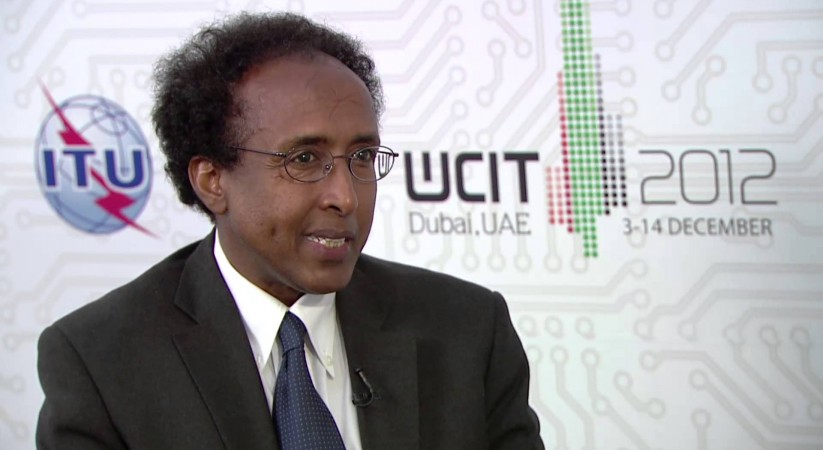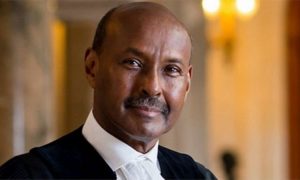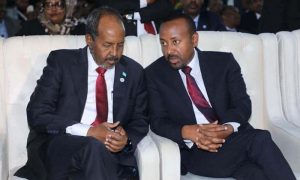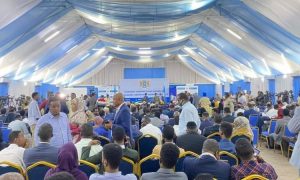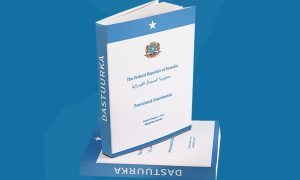
Commentry: I told you so…. Says Former Minister’s Response to NK’s Article ! ( Aug 24 2015) * A brief response to Nicholas Kay’s recent article…. By Mohamed Ibrahim, previous Minister of Post and Telecommunication. Oct 5th 2014.
It is heartening to hear Mr Kay in his latest UN ‘state of the non-nation’ report he is an almost incurable optimist. It is heartening for those on the ground in Somalia because the very intervention needed to effect the cure for that optimism is what is called a reality check. And that checking of reality must cover what the Somali government is actually prepared for.
What will cure Mr Kay of his self-declared optimism? Many Somalis who have been on the ground for last two decades will say could begin by asking any two or more of the almost 275 Somali MPs of the Somali Government that he has so much faith in how prepared they are to effect a transition to democracy in less than 18 months time.
What they would confide to him, which is almost sure to cure him is the reality of the assistance and expertise they know they lack – and still dream of getting from those in the know. But which is still the mirage they know so well it has become their reality.
If there is one phrase every MP knows in his heart, and in the three languages they have to speak if they are given permission to ask those with the expertise they lack, it is ‘set up to fail’. For all hopes for security, federalism, democracy – and above all the power of knowledge to govern themselves – have become the mirage that disappears the closer they get to it.
It is true that the politics to save Somalia, the only politics they have been trusted with, is the politics of optimism. But not one of those MPs has experienced the only optimism worth having – the one that respects the increasing fear they live with daily. For with less than 18 months to go the United Nations has still not
arranged one laptop, one course in parliamentary procedure in the Somali language, one seminar, one case study or one manual that will prevent them from being labelled again a failure.
Parliament? Set up to fail. Federalism? Set up to fail if the parliament does. Banking system? Set up to fail because based on trust of others. A civic state. Already failed. And set up again to fail. Optimism? Set up to fail. A clannish, proud people keen for freedom and independence denied budgets, their own security, sufficient freedom to contract the expertise they need to succeed.
To be set up to succeed needs more than optimism. It needs, now, yesterday, last month and last year, the reality of tangible, targeted and readily transferable expertise that will enable 275 MPs to debate using proper procedure, that will deliver a system of protocols, procedures and ethics to resist the easy option or the called-in favour from the tribe that thinks it put them there. A system that will pay Somali soldiers enough to be the armed, ethical security they can take with them to convince their constituency that the old ways must stop if they want to enjoy the fruits of trade, of education and of freedom.
No, it is not any self-declared optimism that is now required, an optimism that increasingly seems to control more than it sees. The only hope for salvation, for a complete cure, is the virtue of a realistic pessimism.
Rejecting cynicism, what is the way forward? Somali MPs reject over ambition as much as wishful thinking but there is a consensus that government does not have enough resources, financial or civic knowledge-based resources, to ensure meaningful elections are held in 2016.
A summit with all members elected by their tribal bases is needed to press home to Mr Kay and his advisors that his view of Somalia’s preparedness for elections is not just wishful thinking but a dangerous untruth with serious repercussions.
The idea of clan-based federalism is being rejected by individual clans because of the very hardship they are already experiencing, especially in accessing resources in their areas. A case in point is the experience from Haud in contemporary Somali history. In 1957 the giving up of common grazing land under a treaty also involving inadequate consultation, ignorance of the local conditions and a patronising attitude, is still in living memory. What still rankles in both the honouring and
dishonouring of treaties involved in that handover of land to Ethiopia, is that very colonial creation of boundaries where nomadic grazing makes them meaningless – but which can too easily unnecessarily pit one clan against another. Whether ‘divide and rule’ was/is a cynical tactic, a group of clans sharing one language and one religion deserve better.
The other necessity for transition to fair government for a nation which can capitalise on these similarities for peace and prosperity is a Constitution. How can clans be persuaded to put aside differences when the final version of the Provisional Constitution is not yet available for public discussion and engagement. Some point out that federalism, whether ‘clan federalism’ or local autonomy under the rule of law, has not won consensus support amongst the clans because the government has been unable to initiate proper national debate on the issue.
Citing Puntland and Galmudug as being on war alert, the latter two over Galkaio airports, the collapse of the Kismayo and Baidoa reconciliation conferences some claim that that there can be no progress towards democratic processes without some government roadmap. That progress, however, is hamstrung by lack of sufficient expertise to make such meetings possible. All MPs know a national summit on provisions of such a Constitution must build on public discussion of historical grievances which can only be put aside if guarantees of an equal share of future prosperity can be backed up.
Mr Kay’s faith in politics in the light of this analysis is either dangerously out of touch and naïve or the result of the same kind of politicking we remember from the 1920s and mid 1950s. There is nothing new about those ‘deals’ but their divisive consequences are branded into the wounded memory of Somalis who keep the word salvation for religion but expect genuine equality and unity from politics.
—————————————————–
Appendix I
Politics will save Somalia – Nicholas Kay1
by Nicholas Kay, Thursday, September 25, 2014
Sitting in Mogadishu, it’s easy to think the world needs to learn from Somalia. As human suffering escalates in Ukraine, Syria, Iraq, Gaza, Libya, South Sudan and the Central African Republic, Somalia looks increasingly stable and hopeful. Is that just a mirage? Or are there genuine grounds for optimism and even lessons to be drawn?
My answer is an emphatic “yes”. Perhaps, as some say, I’m a professional – almost incurable – optimist. But I am not alone. In New York this week, the UN Secretary-General will convene leaders from a growing band of countries, whose collective efforts over the last years mean that today millions of Somalis can dare to dream that more than two decades of hopeless conflict are over.
Who is saving Somalia?
First and foremost Somalis themselves are writing this new chapter in their nation’s troubled history. Their solution is political – and very Somali in nature, combining modernity and tradition. But the international community – in its broadest sense – also has a significant role in the emerging success. African Union forces continue to expand security and government authority across Somalia. In joint operations with Somali forces, AMISOM is depriving the militant group, Al Shabaab, of key towns. It is now possible to see a day when the terrorists will be reduced to a beleaguered group of insurgents, running out of hiding places and increasingly riven with internal disputes. But we should not be under any illusions. Terrorism will not disappear overnight. Nor will military action – however brave and professional – ever deliver a lasting peace.
Peace and security in Somalia will depend ultimately on political solutions. Somalis are rising to that challenge and undertaking a breath-taking feat of political engineering. They have determined that stability depends not on turning the clock back to the Somalia that existed before the state collapsed in 1991, but rather on building an entirely new political construct: a federal, not unitary, state with democratic, not autocratic, governance. Why federal? The political reality in Somalia today is that power – political, military and economic – has dispersed around the regions. A formalised agreement on sharing and devolving that power is the only practicable way forward.
Many of my constituents believe only Allah and Islamic state, not politics or UN humanitarian interventions, will save Somalia. Others suggested benevolent dictator
might be credible alternative that will outperform all the other current options on the table to rebuild the Somali State.
Somalia needs a new politics
Federalism is not an abstract concept. It is about bringing government closer to the people. Most Somalis have not known a government that provides services and rule of law for more than twenty years. For most, Mogadishu is a remote and even alien place. It has provided nothing to them, is not accountable to them and they feel they have no stake in its future. Creating Federal States with their own governments is not an automatic panacea. There are risks: reaching inclusive political settlements with all the clans and interest groups in a particular area is a long and bumpy road. Competition for power and resources is fierce. Nor is it a zero sum game: the Federal Government must be helped to build its capacity and take charge of its national responsibilities. How to achieve this noble idea? Certainly not via the failed 4.5 formula.
As the new federal map of Somalia emerges, with proto-federal member states taking shape in south, south-west and central Somalia, the intensity and complexity of political negotiation is impressive. But trust between actors is very low. After so many years of state failure, the clan has become a dominant feature of people’s political and security universe. The voice of traditional elders rightly carries great weight. They are able to help people understand that settlements must benefit everyone and that winners cannot and should not “take all”.
In this exciting political landscape, what is the role of the UN and other international partners? Essentially we are doing two things: giving direct support to the Somali-led political process and working collectively to create the conditions for successful elections in 2016. The United Nations Assistance Mission in Somalia (UNSOM) and the African Union Mission in Somalia (AMISOM) provide the glue and a lot of the muscle for the international effort on the ground. Forming a federal Somalia, finalising the Constitution, approving it in a referendum and then having national elections in 2016 will not happen unless security continues to improve, women play a bigger role, institutions grow, the rule of law and respect for human rights take hold, and people’s daily lives and economic prospects revive. On all fronts there are enormous challenges, but also noteworthy progress.
From afar, Somalia often seems frightening – a dangerous no-go area for internationals. But that reality is fast changing. People are often surprised to hear that every day the UN has about 1,300 staff working across Somalia, of whom at least 200 are international staff working in Mogadishu. We are here to help and here to stay for as long as we are needed. And we are not alone: among others the European Union, Inter-Governmental Authority on Development, League of Arab States, Organisation of Islamic Conference, UK, China, Turkey, UAE, US, and Ethiopia are more and more present on the ground.
2016 is just around the corner
The Federal Government of Somalia and its President Hassan Sheikh Mohamud are determined to hold elections in a truly federal Somalia in 2016. Their vision is compelling. As the United Nations we shall do our utmost to help. But ultimately the key to success lies in Somali hands and, increasingly, in the hands of members of parliament. As they resume work in September, they have key legislation to pass to enable the country to move forward and enjoy a more stable future. Without the laws to establish the National Independent Election Commission and the Boundaries and Federation Commission, there will be no federalism, referendum or election. This is a time for immense discipline and national unity. Somalis and their international partners have high expectations. This was a clear message given by members of the UN Security Council when they made their historic visit to Mogadishu in August. The message should not fall on deaf ears. Somalis will only enjoy peace when it comes from a political solution. Somalia’s politicians must now be its peace-builders.
_____________________________________________________________________________________Xafiiska Wararka Qaranimo Online | Mogadishu, Somalia
_____________________________________________________________________________________Advertisement
_____________________________________________________________________________________


